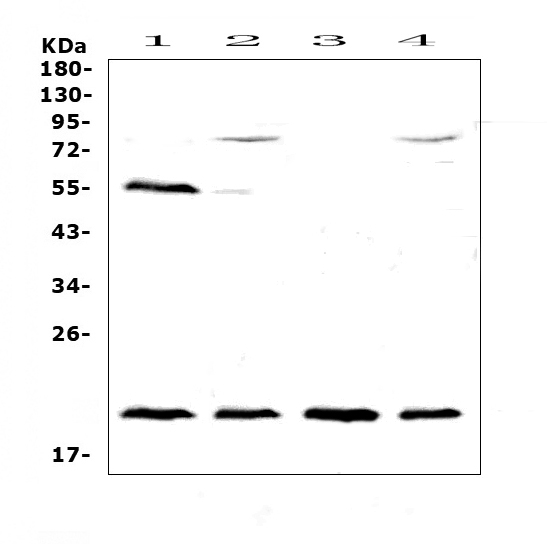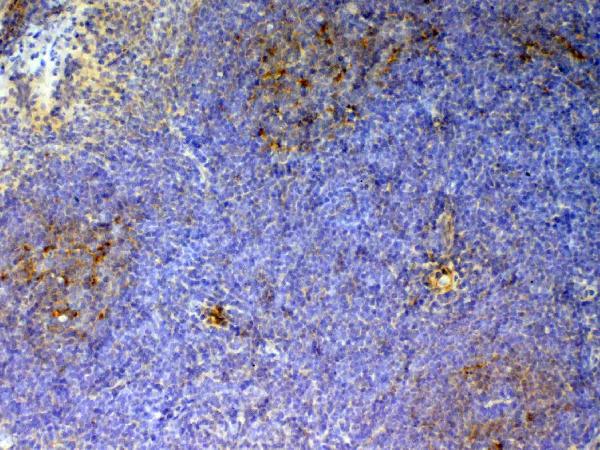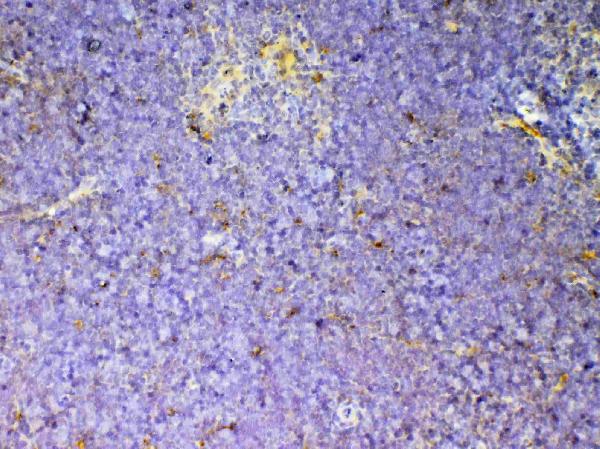Product Info Summary
| SKU: | A00914 |
|---|---|
| Size: | 100 μg/vial |
| Reactive Species: | Mouse, Rat |
| Host: | Rabbit |
| Application: | ELISA, IHC, WB |
Customers Who Bought This Also Bought
Product info
Product Name
Anti-CD59/Cd59a Antibody Picoband®
SKU/Catalog Number
A00914
Size
100 μg/vial
Form
Lyophilized
Description
Boster Bio Anti-CD59/Cd59a Antibody Picoband® catalog # A00914. Tested in ELISA, IHC, WB applications. This antibody reacts with Mouse, Rat. The brand Picoband indicates this is a premium antibody that guarantees superior quality, high affinity, and strong signals with minimal background in Western blot applications. Only our best-performing antibodies are designated as Picoband, ensuring unmatched performance.
Storage & Handling
Store at -20˚C for one year from date of receipt. After reconstitution, at 4˚C for one month. It can also be aliquotted and stored frozen at -20˚C for six months. Avoid repeated freeze-thaw cycles.
Cite This Product
Anti-CD59/Cd59a Antibody Picoband® (Boster Biological Technology, Pleasanton CA, USA, Catalog # A00914)
Host
Rabbit
Contents
Each vial contains 4mg Trehalose, 0.9mg NaCl, 0.2mg Na2HPO4, 0.05mg NaN3.
Clonality
Polyclonal
Isotype
Rabbit IgG
Immunogen
E. coli-derived mouse CD59 recombinant protein (Position: L24-S96).
*Blocking peptide can be purchased. Costs vary based on immunogen length. Contact us for pricing.
Cross-reactivity
No cross-reactivity with other proteins.
Reactive Species
A00914 is reactive to Cd59a in Mouse, Rat
Reconstitution
Add 0.2ml of distilled water will yield a concentration of 500ug/ml.
Observed Molecular Weight
20 kDa
Calculated molecular weight
13.648kDa
Background of Cd59a
CD59 glycoprotein, also known as MAC-inhibitory protein (MAC-IP), membrane inhibitor of reactive lysis (MIRL), or protectin, is a protein that in humans is encoded by the CD59 gene. This gene encodes a cell surface glycoprotein that regulates complement-mediated cell lysis, and it is involved in lymphocyte signal transduction. This protein is a potent inhibitor of the complement membrane attack complex, whereby it binds complement C8 and/or C9 during the assembly of this complex, thereby inhibiting the incorporation of multiple copies of C9 into the complex, which is necessary for osmolytic pore formation. This protein also plays a role in signal transduction pathways in the activation of T cells. Mutations in this gene cause CD59 deficiency, a disease resulting in hemolytic anemia and thrombosis, and which causes cerebral infarction. Multiple alternatively spliced transcript variants, which encode the same protein, have been identified for this gene.
Antibody Validation
Boster validates all antibodies on WB, IHC, ICC, Immunofluorescence, and ELISA with known positive control and negative samples to ensure specificity and high affinity, including thorough antibody incubations.
Application & Images
Applications
A00914 is guaranteed for ELISA, IHC, WB Boster Guarantee
Assay Dilutions Recommendation
The recommendations below provide a starting point for assay optimization. The actual working concentration varies and should be decided by the user.
Western blot, 0.1-0.5μg/ml
Immunohistochemistry (Paraffin-embedded Section), 0.5-1μg/ml
ELISA, 0.1-0.5μg/ml
Positive Control
WB: rat liver tissue, rat kidney tissue, rat spleen tissue, rat brain tissue
IHC: mouse spleen tissue, mouse thymus tissue
Validation Images & Assay Conditions

Click image to see more details
Figure 1. Western blot analysis of CD59 using anti-CD59 antibody (A00914).
Electrophoresis was performed on a 5-20% SDS-PAGE gel at 70V (Stacking gel) / 90V (Resolving gel) for 2-3 hours. The sample well of each lane was loaded with 50ug of sample under reducing conditions.
Lane 1: rat liver tissue lysates,
Lane 2: rat kidney tissue lysates,
Lane 3: rat spleen tissue lysates,
Lane 4: rat brain tissue lysates.
After Electrophoresis, proteins were transferred to a Nitrocellulose membrane at 150mA for 50-90 minutes. Blocked the membrane with 5% Non-fat Milk/ TBS for 1.5 hour at RT. The membrane was incubated with rabbit anti-CD59 antigen affinity purified polyclonal antibody (Catalog # A00914) at 0.5 μg/mL overnight at 4°C, then washed with TBS-0.1%Tween 3 times with 5 minutes each and probed with a goat anti-rabbit IgG-HRP secondary antibody at a dilution of 1:10000 for 1.5 hour at RT. The signal is developed using an Enhanced Chemiluminescent detection (ECL) kit (Catalog # EK1002) with Tanon 5200 system. A specific band was detected for CD59 at approximately 20KD. The expected band size for CD59 is at 14KD.

Click image to see more details
Figure 2. IHC analysis of CD59 using anti-CD59 antibody (A00914).
CD59 was detected in paraffin-embedded section of mouse spleen tissue. Heat mediated antigen retrieval was performed in citrate buffer (pH6, epitope retrieval solution) for 20 mins. The tissue section was blocked with 10% goat serum. The tissue section was then incubated with 1μg/ml rabbit anti-CD59 Antibody (A00914) overnight at 4°C. Biotinylated goat anti-rabbit IgG was used as secondary antibody and incubated for 30 minutes at 37°C. The tissue section was developed using Strepavidin-Biotin-Complex (SABC)(Catalog # SA1022) with DAB as the chromogen.

Click image to see more details
Figure 3. IHC analysis of CD59 using anti-CD59 antibody (A00914).
CD59 was detected in paraffin-embedded section of mouse thymus tissue. Heat mediated antigen retrieval was performed in citrate buffer (pH6, epitope retrieval solution) for 20 mins. The tissue section was blocked with 10% goat serum. The tissue section was then incubated with 1μg/ml rabbit anti-CD59 Antibody (A00914) overnight at 4°C. Biotinylated goat anti-rabbit IgG was used as secondary antibody and incubated for 30 minutes at 37°C. The tissue section was developed using Strepavidin-Biotin-Complex (SABC)(Catalog # SA1022) with DAB as the chromogen.
Protein Target Info & Infographic
Gene/Protein Information For Cd59a (Source: Uniprot.org, NCBI)
Gene Name
Cd59a
Full Name
CD59A glycoprotein
Weight
13.648kDa
Alternative Names
CD59A glycoprotein; MAC-inhibitory protein; MAC-IP; Membrane attack complex inhibition factor; MACIF; Protectin; CD59; Cd59a; Cd59 Cd59a|AA987121, Cd59, prot, protectin|CD59a |CD59A glycoprotein|CD59 |MAC-IP|MAC-inhibitory protein|MACIF|membrane attack complex inhibition factor
*If product is indicated to react with multiple species, protein info is based on the gene entry specified above in "Species".For more info on Cd59a, check out the Cd59a Infographic

We have 30,000+ of these available, one for each gene! Check them out.
In this infographic, you will see the following information for Cd59a: database IDs, superfamily, protein function, synonyms, molecular weight, chromosomal locations, tissues of expression, subcellular locations, post-translational modifications, and related diseases, research areas & pathways. If you want to see more information included, or would like to contribute to it and be acknowledged, please contact [email protected].
Specific Publications For Anti-CD59/Cd59a Antibody Picoband® (A00914)
Hello CJ!
No publications found for A00914
*Do you have publications using this product? Share with us and receive a reward. Ask us for more details.
Recommended Resources
Here are featured tools and databases that you might find useful.
- Boster's Pathways Library
- Protein Databases
- Bioscience Research Protocol Resources
- Data Processing & Analysis Software
- Photo Editing Software
- Scientific Literature Resources
- Research Paper Management Tools
- Molecular Biology Software
- Primer Design Tools
- Bioinformatics Tools
- Phylogenetic Tree Analysis
Customer Reviews
Have you used Anti-CD59/Cd59a Antibody Picoband®?
Submit a review and receive an Amazon gift card.
- $30 for a review with an image
0 Reviews For Anti-CD59/Cd59a Antibody Picoband®
Customer Q&As
Have a question?
Find answers in Q&As, reviews.
Can't find your answer?
Submit your question
7 Customer Q&As for Anti-CD59/Cd59a Antibody Picoband®
Question
We are currently using anti-CD59/Cd59a antibody A00914 for mouse tissue, and we are satisfied with the WB results. The species of reactivity given in the datasheet says mouse, rat. Is it possible that the antibody can work on goat tissues as well?
Verified Customer
Verified customer
Asked: 2019-11-04
Answer
The anti-CD59/Cd59a antibody (A00914) has not been validated for cross reactivity specifically with goat tissues, though there is a good chance of cross reactivity. We have an innovator award program that if you test this antibody and show it works in goat you can get your next antibody for free. Please contact me if I can help you with anything.
Boster Scientific Support
Answered: 2019-11-04
Question
Does A00914 anti-CD59/Cd59a antibody work on parafin embedded sections? If so, which fixation method do you recommend we use (PFA, paraformaldehyde, other)?
Verified Customer
Verified customer
Asked: 2019-10-07
Answer
It shows on the product datasheet, A00914 anti-CD59/Cd59a antibody as been validated on ELISA. It is best to use PFA for fixation because it has better tissue penetration ability. PFA needs to be prepared fresh before use. Long term stored PFA turns into formalin, as the PFA molecules congregate and become formalin.
Boster Scientific Support
Answered: 2019-10-07
Question
Is there a BSA free version of anti-CD59/Cd59a antibody A00914 available?
Verified Customer
Verified customer
Asked: 2019-05-22
Answer
I appreciate your recent telephone inquiry. I can confirm that some lots of this anti-CD59/Cd59a antibody A00914 are BSA free. For now, these lots are available and we can make a BSA free formula for you free of charge. It will take 3 extra days to prepare. If you require this antibody BSA free again in future, please do not hesitate to contact me and I will be pleased to check which lots we have in stock that are BSA free.
Boster Scientific Support
Answered: 2019-05-22
Question
We want to test anti-CD59/Cd59a antibody A00914 on mouse kidney for research purposes, then I may be interested in using anti-CD59/Cd59a antibody A00914 for diagnostic purposes as well. Is the antibody suitable for diagnostic purposes?
Verified Customer
Verified customer
Asked: 2019-03-27
Answer
The products we sell, including anti-CD59/Cd59a antibody A00914, are only intended for research use. They would not be suitable for use in diagnostic work. If you have the means to develop a product into diagnostic use, and are interested in collaborating with us and develop our product into an IVD product, please contact us for more discussions.
Boster Scientific Support
Answered: 2019-03-27
Question
I see that the anti-CD59/Cd59a antibody A00914 works with ELISA, what is the protocol used to produce the result images on the product page?
Verified Customer
Verified customer
Asked: 2018-01-31
Answer
You can find protocols for ELISA on the "support/technical resources" section of our navigation menu. If you have any further questions, please send an email to [email protected]
Boster Scientific Support
Answered: 2018-01-31
Question
I appreciate helping with my inquiry over the phone. Here are the WB image, lot number and protocol we used for kidney using anti-CD59/Cd59a antibody A00914. Let me know if you need anything else.
Verified Customer
Verified customer
Asked: 2017-12-27
Answer
Thanks for the data. You have provided everything we needed. Our lab team are working to resolve your inquiry as quickly as possible, and we appreciate your patience and understanding! Please let me know if there is anything you need in the meantime.
Boster Scientific Support
Answered: 2017-12-27
Question
Does anti-CD59/Cd59a antibody A00914 work on pig WB with kidney?
T. Evans
Verified customer
Asked: 2014-04-18
Answer
Our lab technicians have not tested anti-CD59/Cd59a antibody A00914 on pig. You can run a BLAST between pig and the immunogen sequence of anti-CD59/Cd59a antibody A00914 to see if they may cross-react. If the sequence homology is close, then you can perform a pilot test. Keep in mind that since we have not validated pig samples, this use of the antibody is not covered by our guarantee. However we have an innovator award program that if you test this antibody and show it works in pig kidney in WB, you can get your next antibody for free.
Boster Scientific Support
Answered: 2014-04-18




